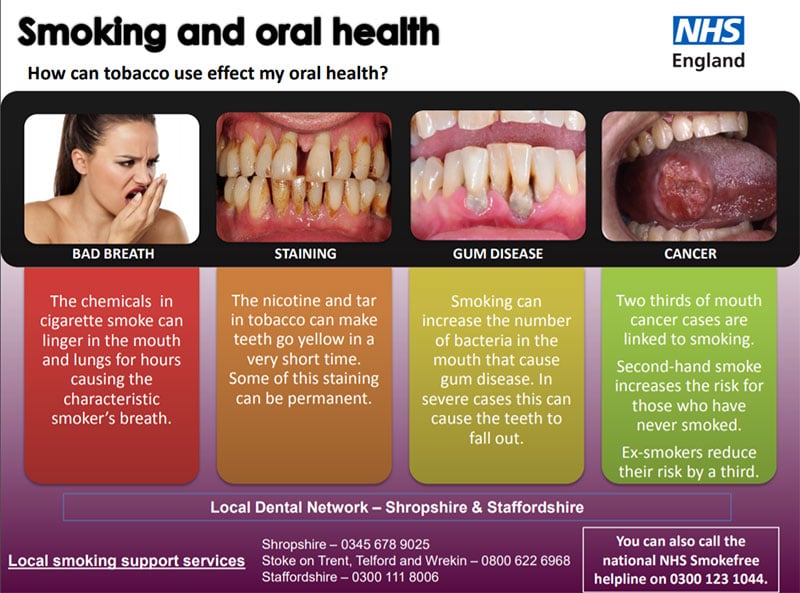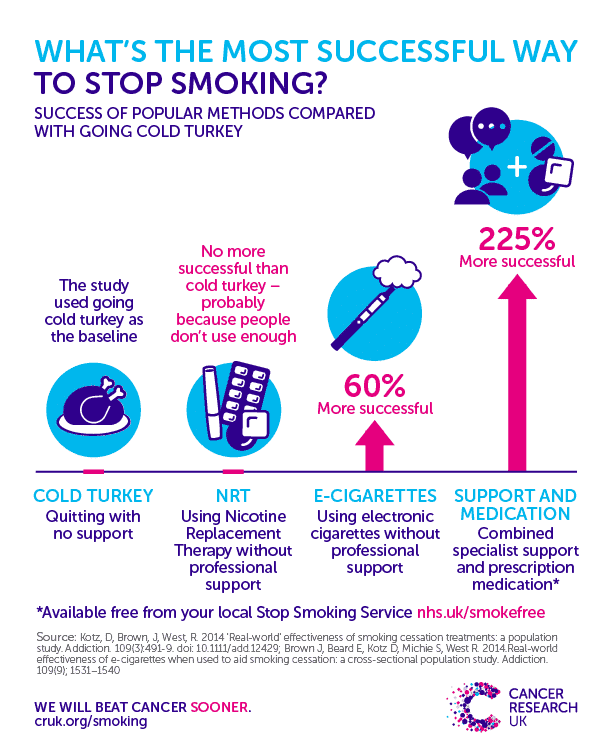It is well known that smoking can lead to many different health issues and diseases that may prove fatal.
Most people are aware of the effect that smoking can have on their body and general health, but many are unaware of the effects that smoking has on their mouths. These include:
- increased risk of oral cancer
- gum disease
- stained teeth
- bad breath (halitosis/oral malodour)
- tooth loss
- loss of taste and smell
- reduced blood supply to the mouth
- increased build-up of plaque biofilm and tartar on your teeth
- delayed healing following tooth extraction and other surgery in the mouth

Smoking is still the leading cause of preventable death and disease. Other forms of tobacco or ‘smokeless tobacco’ also impact on leading a healthy disease-free life. Tobacco use, both smoking and chewing tobacco, seriously affects general and oral health. At least 50 different diseases are caused by tobacco use including various types of cancers, ischaemic heart disease (when blood supply to the body tissues are restricted), strokes and chronic lung disease. The most significant effects of tobacco use on the mouth are oral cancers and pre-cancers, increased severity and extent of periodontal (gum) diseases, tooth loss and poor wound-healing post operatively.
Smokers are seven to ten times more likely to suffer from oral cancer than people who have never smoked, with long-term, regular users of smokeless tobacco being more than 11 times more at risk than a non-user. Find out more about mouth cancer here.

As we can see, impact of tobacco use on health is alarming, and so, the benefits of stopping are substantial, particularly for people under 35 years of age, who, if they quit successfully will have a normal life expectancy.
Many of the negative effects of tobacco use on the mouth are reversible. Whether smoked or chewed, nicotine from tobacco is highly addictive, which makes stopping a major challenge for most users. The majority of cigarette smokers report that they would like to stop, having made many attempts to quit. Some people can stop without any support, however, most people benefit from using smoking cessation medications and the support of their local stop smoking service. Find out more about quitting here and how to find your local stop smoking service here.
Smoking (and smokeless tobacco products) is a major risk factor for developing gum disease (periodontitis) and also impacts the response to treatment for gum disease. This means that people with gum disease who continue smoking are more likely to lose teeth than non-smokers. Always tell your dental team if you smoke, have ever smoked or use tobacco products or nicotine replacement products.
E-Cigarettes
E-cigarette is a term that was commonly used when the first devices became available. They looked like tobacco cigarettes, but have since evolved with the shape and technology now varying greatly. These developments mean that the term e-cigarettes do not clearly reflect the products available in the UK and across the world. Vapes, vaporisers, vape pens, hookah pens, electronic cigarettes (e-cigarettes or e-cigs), and e-pipes are some of the many terms used to describe electronic nicotine delivery systems (ENDS). ENDS are non-combustible tobacco products. Common terminology is being developed in the UK and internationally, but for now we will use the term e-cigarette here.
These products use an “e-liquid” that may contain nicotine, as well as flavourings, propylene glycol, vegetable glycerine, and other ingredients. The liquid is heated to create an aerosol that the user inhales. They do not produce tar or carbon monoxide, two of the most harmful by products in tobacco smoke.
How does this relate to oral health? There are concerns that vaping creates an environment which promotes harmful bacteria in the mouth, and that vaping can lead to tooth decay, bone loss and inflamed gums. So while the use of e-cigarettes is accepted as an effective tool to help smokers quit, they carry a small fraction of the risk of cigarettes, however, are not completely risk free.
A major UK clinical trial published in 2019 found that, when combined with expert face-to-face support, people who used e-cigarettes to quit smoking were twice as likely to succeed as people who used other nicotine replacement products, such as patches or gum.
They should not, however, be used as a ‘safe’ alternative to tobacco use. Find out more about using e-cigarettes to stop smoking here.

Find out more about mouth cancer here.

